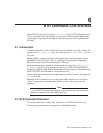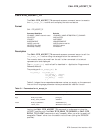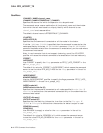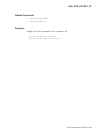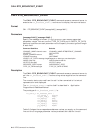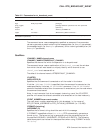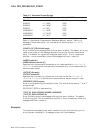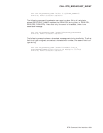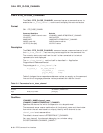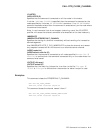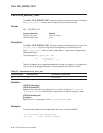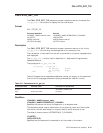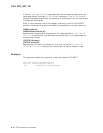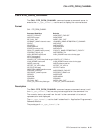
CALL RTR_BROADCAST_EVENT
Table 6–3 Generated Format Strings
Data Type With /LENGTH= With /NOLENGTH
STRING =n, "%nC" "%nC" where n=strlen(string)
SIGNED =1, "%SB" "%SL"
SIGNED =2, "%SW" "%SL"
SIGNED =4, "%SL" "%SL"
UNSIGNED =1, "%UB" "%SL"
UNSIGNED =2, "%UW" "%SL"
UNSIGNED =4, "%UL" "%SL"
Refer to Application Programmer’s Reference Manual, section ‘‘Defining a
Message Format Description’’ for information on constructing a
fmt-string
parameter.
/LENGTH_OF_FIELD=field-length
Enter the size of the message field that you want to define. The default for string
types is the length of the message entered, plus one (for the zero termination
byte). The default for signed and unsigned types is four. This is a positional
qualifier; it must immediately follow the message field that it refers to.
/NODE[=node-list]
/NODE=default-node-list (D)
Specifies that the command is executed on all nodes specified in
node-list
.If
node-list
is omitted then the command is executed only on the node where the
command was issued.
/OUTPUT[=file-spec]
/OUTPUT=stdout (D)
Specifies that the resulting information is written to the file
file-spec
.If
/OUTPUT
or
file-spec
is omitted then the standard or default output is used.
/RECIPIENT_SPEC=rcpspc
Enter a string specifying the recipient name. The wild-card characters ‘‘*’’ and ‘‘?’’
are permitted.
RECIPIENT_SPEC is case sensitive
/TYPE_OF_DATA=STRING| SIGNED |UNSIGNED
/TYPE_OF_DATA=STRING (D)
Enter the data type of the message field that you want to define. The default
is the string type. This is a positional qualifier; it must immediately follow the
message field that it refers to.
Examples
This command broadcasts user event number 23 to all channels having a null
string rcpnam (the default). A message is sent with the broadcast.
6–8 RTR Command Line Interface




